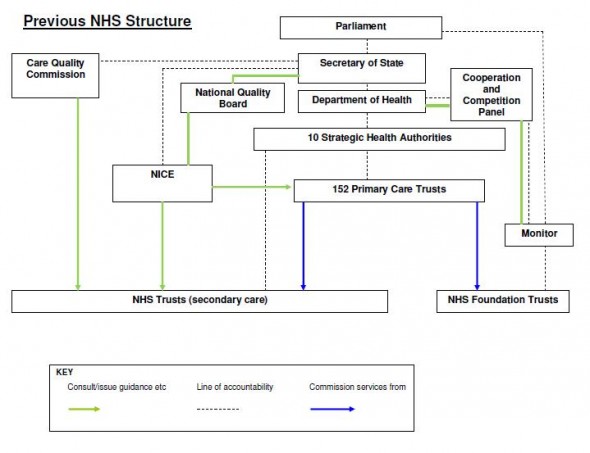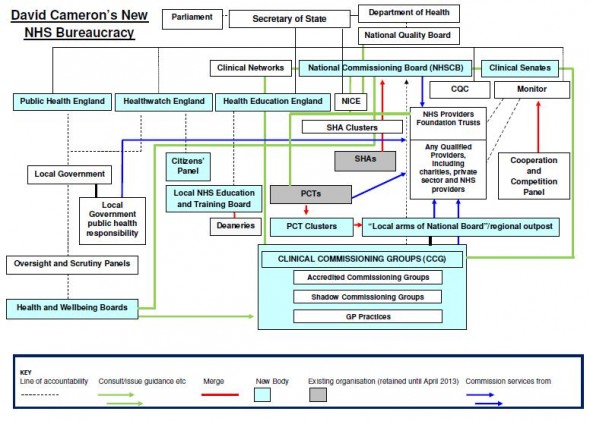The Labour Party are ridiculing the Con-Dems’ coalition governments’ proposed changes to the NHS as excessively complex and incomprehensible. Previous to the 2010 general election Cameron promised no more top-down reorganisation of the NHS and said “The recent history of the NHS reads like a wretched bowl of Alphabetti Spagetti and it has got to stop”.
These organograms(?) – credited to Labour policy wonks – show the current and proposed excessive spagetti-like top-down re-organisation of the NHS that Cameron said would not happen and “has got to stop”.


The Guardian reports that
The Liberal Democrats will not debate a formal motion on the future of the NHS at their conference, but will hear from a balanced group of speakers including Baroness Williams on whether the reforms sought by the party at its spring conference have been achieved through the listening exercise.
Perhaps they should amend their name to the Liberals or Conservatives?
- Conservative election poster 2010
A few recent news articles about the UK’s Conservative and Liberal-Democrat coalition government – the ConDem’s – brutal attack on the National Health Service.
David Cameron, pre-election, told National Health Service staff there would be no more “top-down reorganisations”. The recent history of the organisation had been “like a bowl of alphabetty spaghetti“, he pointed out.
The government is getting rid of primary care trusts. At the same time it is creating a National Commissioning Board, Clinical Senates, Public Health England, Healthwatch England, Health Education England, Citizens’ Panels, Local Education and Training Boards and Health and Wellbeing Boards and shadow Clinical Commissioning Groups.
Even now Cameron has insisted that he has been “taking out” bureaucracy out of the National Health Service. These two graphics would suggest a rather different situation.
…
Labour ridicules David Cameron’s NHS structure | Politics | The Guardian
…
Before the election, David Cameron promised NHS staff there would be no more top-down reorganisation of the NHS, describing its recent history as “like a bowl of alphabetti spaghetti”. His commitment was reiterated in the coalition agreement and was widely welcomed by health service staff. At the latest relaunch of his reorganisation plans, he claimed that he was “taking out a huge amount of bureaucracy” from the NHS.
Yet Cameron’s new NHS structure includes the creation of a National Commissioning Board, intended to be separate from ministers, at the apex of the reformed organisation. The chief executive designate of the board, Sir David Nicholson, has acknowledged that it “could become the greatest quango in the sky we have seen”.
Other new bodies to be created include clinical senates, Public Health England, Healthwatch England, Health Education England, citizens’ panels, local education and training boards, and health and wellbeing boards. Primary care trusts (PCTs) will be replaced by accredited and shadow clinical commissioning groups (CCGs). Labour said confusion remained about the transfer of responsibility from PCTs to CCGs, with senior officials at the Department of Health reportedly raising concerns about the danger of operating a two-tier commissioning system.
One senior commissioner was reported as saying “You can just about tolerate a two-tier provision system but we can’t operate two-tier commissioning” and another as saying “Either it doesn’t really work like this [as announced] or it will be a feverishly expensive bureaucracy”.
…
We all need to get behind anti-Health Bill campaign » Hospital Dr
The NHS Consultants’ Association backs the BMA campaign to withdraw the Health and Social Care Bill.
Following the Executive Committee meeting of the NHSCA on the 4 August 2011, there was a unanimous decision to congratulate and support the BMA over its decision to mount a public campaign to call for withdrawal of the Health and Social Care Bill.
The NHSCA continues to believe that the Health and Social Care Bill represents the greatest threat to the NHS in its history. Despite the government’s proposed changes to the Bill following the Future Forum report, the key policy levers to deliver a full blooded market based system with increasing NHS privatisation remain intact. Worse still, the bill is now even more complicated and will be more costly to implement.
The Royal College of GPs has worked out that the number of NHS statutory bodies is going to increase from 163 bodies to 521! No wonder why Dr Hamish Meldrum, chair of BMA council stated that the Bill was: “Hopelessly complex and it really would be better if it were withdrawn.”
We are now left with a policy mess, at a time when the NHS is facing the greatest funding crisis in its history, with the QIPP efficiency drive aiming to deliver £20bn of savings by 2014. This will actually act as a catalyst to drive increasing privatisation of the NHS, as PCT clusters are forced to ration NHS care due to financial constraints, and NHS trusts come under huge financial pressure to cut costs.
We are already seeing an increase in NHS waiting lists and many PCTs reducing their lists of ‘NHS core services’, both of which result in increasing uptake of private health insurance policies.
…
GP warning over ‘crazy’ rapid roll-out of NHS 111 | GPonline.com
Strategic health authorities have been given seven weeks to tell the DoH how and when they plan to roll-out NHS 111 hotlines across their area.
But one senior GP warned the deadline was ‘crazy’ given that the pilot NHS 111 schemes across the UK were either incomplete, or yet even to begin.
…
Tories’ circular logic / Features / Home – Morning Star
The government is demanding that the National Health Service doesn’t use NHS hospitals.
Instead, the NHS must pay David Cameron’s dinner guests for their operations.
It sounds quite mad but it is, sadly, quite true. At the end of July a little-known government quango called the NHS Co-operation and Competition Panel ruled that Wiltshire and Bath NHS were wrong not to give a company called Circle Health millions of pounds for operations.
The Tories love to talk about “social enterprises,” claiming they are a new type of firm that use market methods but are driven by ethical impulses.
Circle claims to be such a beast.
Last January future Tory Health Secretary Andrew Lansley spoke at the firm’s glamorous private hospital in Bath to praise its work.
Of course, the fact that behind all the waffle about “social enterprises” lurk some very profit-hungry Tory donors may well have encouraged Lansley to go to the shindig.
Circle is 49 per cent owned by its employees, which is why it calls itself a “social enterprise.”
But the firm is also 51 per cent owned by private investors, including around 40 per cent by hedge funds Odey Asset Management and Lansdowne Holdings.
Since 2003 Crispin Odey and Lansdowne’s Paul Ruddock and David Craigen have between them donated £561,000 to the Tories.
This money buys them membership of the Tories’ Leader’s Club and regular dinners with Cameron.
…
‘Miracle’ MS Pill Won’t Get NHS Funding | LBC
Fingolimod is the first pill to treat MS, but now NICE, the health watchdog, has ruled it should not be funded by the NHS because it is not cost effective.
Amanda Cook from Norfolk has taken the tablet for the past three years.
She told Sky News: “This tablet has changed my life completely. I think it’s a very disappointing decision.
“It takes away another option for MS therapies and I think it’s the wrong decision.”
Research found that Fingolimod reduces the number of relapses for sufferers by more than a half, and cuts disability progression by 30 percent in some cases.
…
